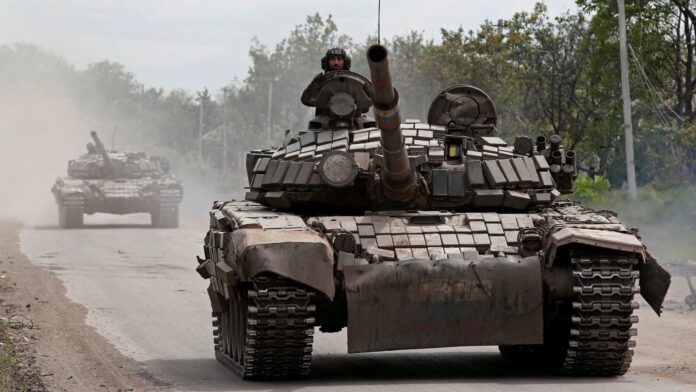Egyptian billionaire Naguib Sawiris did not mince words when expressing his thoughts on Russian President Vladimir Putin and his country’s invasion of Ukraine.
Asked by CNBC’s Hadley Gamble if he expected civil unrest in Egypt due to food shortages triggered by the war, Sawiris, the chairman and CEO of Orascom Investment Holding, said he did not — he argued that people would know the crisis was caused by Putin and not their own government.
“I don’t think so,” Sawiris said Wednesday, “Because people understand that this crisis is not of our own making. I mean, it’s the making of a crazy man that woke up one day and decided to invade a peaceful country with no warning.”
Sawiris then referenced French President Emmanuel Macron’s attempts to continue diplomatic engagement with Putin, more than three months into the war that has killed thousands of civilians and flattened several Ukrainian cities.
Macron stressed in May that Putin must not be humiliated and that the door must be left open to improve diplomatic relations. The call echoed that of some Western analysts who say Putin should be able to “save face” amid this war in order to achieve a diplomatic settlement.
An aerial view shows destroyed houses after strike in the town of Pryvillya at the eastern Ukrainian region of Donbas on June 14, 2022, amid Russian invasion of Ukraine.
Aris Messinis | AFP | Getty Images
Sawiris, among many others, responded to those calls with criticism.
“Contrary to what Mr. Macron is saying, we shouldn’t care about his feelings, to hurt his feelings. We should be winning this war, because it’s another Hitler in the making.”
“It’s the same story in the Second World War,” he continued. “It started like that, we appeased Hitler by giving him a piece of Czechoslovakia. So then he walks into Poland, he occupies the whole thing, and he continues and he continues — it’s not going to stop there.
Russia’s Foreign Ministry and the Russian Embassy in London did not reply to CNBC requests for comment.
To appease or not to appease?
Putin claims his aim is to “demilitarize” and “denazify” Ukraine, a sovereign democratic country with a Jewish president. The Kremlin insists it is not targeting civilians, despite mounting and well-documented evidence to the contrary, including bombarded residential areas and the discovery of mass graves in cities and towns attacked and occupied by Russian troops.
Russian forces now occupy about 20% of Ukraine, and bloody fighting rages in the eastern Donbas region, which the Kremlin has described as an “unconditional priority.”
“Trying to avoid a confrontation can be always perceived as weakness, and will not be a deterrent,” Sawiris said. “And then the end, what are we going to do? We see all these Ukrainians dying in front of our eyes, are we going to be watching that? No? So, I am not in favor of appeasing this man.”
An excavation team carries a body of Ukrainian civilian murdered by Russian army in a forest near Bucha, Ukraine – June 13, 2022.
Dominika Zarzycka | Nurphoto | Getty Images
Several critics of Putin have likened the Russian president to Nazi leader Adolf Hitler, who in the lead up to World War II invaded the Sudetenland, a swathe of the former Czechoslovakia that was at the time inhabited by Sudeten Germans. Historians highlight the failed attempts of some European leaders then to appease Hitler, which did nothing to slow his military push across the continent.
Some Ukrainian and Western officials and analysts now warn that other countries like Moldova, Georgia, or the Baltic states could be next if Putin is not stopped. The Kremlin has not announced such aims, and initially premised its invasion of Ukraine on the latter’s aim to join the NATO alliance.
Tanks of pro-Russian troops drive along a street during Ukraine-Russia conflict in the town of Popasna in the Luhansk Region, Ukraine May 26, 2022.
Alexander Ermochenko | Reuters
But almost four months into the war, Putin seems to have changed his rationale for continuing what he calls Russia’s “special military operation.” In the last week, he evoked Russia’s 18th-century tsar Peter the Great, who was credited with modernizing and enlarging Russia through expansionist wars, in comments widely seen as justifying imperial expansion and the takeover of Ukrainian land.
“Peter the Great waged the Great Northern War for 21 years. It would seem that he was at war with Sweden, he took something from them,” Putin said, according to a Reuters translation. He then added, “He did not take anything from them, he returned [what was Russia’s].”
Putin also referenced the Ukraine invasion, saying: “Apparently, it also fell to us to return [what is Russia’s] and strengthen [the country]. And if we proceed from the fact that these basic values form the basis of our existence, we will certainly succeed in solving the tasks that we face.”


